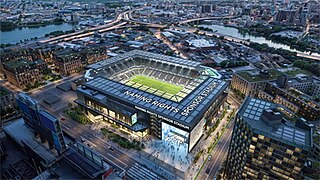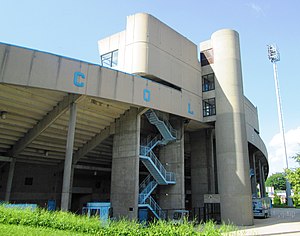
CEFCU ('sef-kyü) Stadium, formerly known as Spartan Stadium, is an outdoor athletic stadium on the west coast of the United States, located in the Spartan Keyes neighborhood of central San Jose, California. Owned by San José State University, the venue is the longtime home of Spartan football; it also hosts the university's commencement ceremony on Memorial Day weekend, and occasional high school football games. Known as Spartan Stadium for over eight decades, it was renamed in 2016.
The NewYork-Presbyterian Hospital, a nonprofit academic medical center in New York City, is the primary teaching hospital for two Ivy League medical schools, Weill Cornell Medicine at Cornell University and Columbia University Vagelos College of Physicians and Surgeons at Columbia University. The hospital includes seven campuses located throughout the New York metropolitan area. The hospital's two flagship medical centers, Columbia University Irving Medical Center and Weill Cornell Medical Center, are located on opposite side of Upper Manhattan.

Robert Kenneth Kraft is an American sports executive and businessman. He is the chairman and chief executive officer (CEO) of the Kraft Group, a diversified holding company with assets in paper and packaging, sports and entertainment, real estate development, and a private equity portfolio. Since 1994, he has owned the New England Patriots of the National Football League (NFL). Kraft also owns the New England Revolution of Major League Soccer (MLS), which he founded in 1996, and the esport-based Boston Uprising, which he founded in 2017. He has an estimated net worth of $11.1 billion dollars according to Forbes.

Darrell K Royal Memorial Stadium, located in Austin, Texas, on the campus of the University of Texas, has been home to the Longhorns football team since 1924. The stadium has delivered a home field advantage with the team's home record through November 17, 2018 being 375–117–10 (.764). The official stadium seating capacity is 100,119, making the stadium the largest in the Big 12 Conference, the seventh largest stadium in the United States, and the ninth largest stadium in the world.

Tabor College is a private Mennonite college in Hillsboro, Kansas. It is owned and operated by the U.S. Conference of Mennonite Brethren Churches and adheres to Anabaptist doctrine. There were 594 students enrolled at the Tabor College Hillsboro campus for the Fall 2014 semester. Total enrollment, including the Tabor College School of Adult and Graduate Studies in Wichita, was 766.

Plaster Stadium is a 17,500-seat football stadium located in Springfield, Missouri. It is home to the Missouri State Bears football team.

A multi-purpose stadium is a type of stadium designed to be easily used for multiple types of events. While any stadium could potentially host more than one type of sport or event, this concept usually refers to a specific design philosophy that stresses multifunctionality over specificity. It is used most commonly in Canada and the United States, where the two most popular outdoor team sports—Canadian football or American football and baseball—require radically different facilities. Football uses a rectangular field, while baseball is played on a diamond with a large outfield. Since Canadian football fields are larger than American ones, the design specifications for Canadian facilities are somewhat less demanding. The particular design to accommodate both is usually an oval, although some later designs use an octorad. While building stadiums in this way means that sports teams and governments can share costs, it also presents some challenges.
The Rocco B. Commisso Soccer Stadium is a 3,500 seat soccer-specific stadium located in Inwood, on the northernmost tip of the island of Manhattan, New York City, within the Baker Athletic Complex. The stadium is named in honor of Rocco B. Commisso, former co-captain of Columbia's 1970 varsity soccer team, current owner and Chairman of the New York Cosmos and ACF Fiorentina, and the head of cable television provider Mediacom.
Lawrence Arthur Wien was an American lawyer, philanthropist, and real estate investor. Wien pioneered the concept of real estate syndicates.

The New York City FC stadium is a proposed soccer-specific stadium to be built in Willets Point in the New York City borough of Queens for New York City FC of Major League Soccer (MLS), who currently play home games at Yankee Stadium and Citi Field. The stadium is scheduled to be completed in 2027.
The 2014 Columbia Lions football team represented Columbia University in the 2014 NCAA Division I FCS football season. They were led by third year head coach Pete Mangurian and played their home games at Robert K. Kraft Field at Lawrence A. Wien Stadium. They were a member of the Ivy League. They finished the season 0–10, 0–7 in Ivy League play to finish in last place. This was the seventh time, and second consecutive year, the school ended the season winless. Columbia averaged 5,574 fans per game.

Albertsons Stadium is an outdoor athletic stadium in the western United States, located on the campus of Boise State University in Boise, Idaho. It is the home field of the Boise State Broncos of the Mountain West Conference. Known as Bronco Stadium for its first 44 seasons, it was renamed in May 2014 when Albertsons, a chain of grocery stores founded by Boise area resident Joe Albertson, purchased the naming rights.
The 2015 Columbia Lions football team represented Columbia University in the 2015 NCAA Division I FCS football season. They were led by first year head coach Al Bagnoli and played their home games at Robert K. Kraft Field at Lawrence A. Wien Stadium. They were a member of the Ivy League. They finished the season 2–8, 1–6 in Ivy League play to finish a tie for seventh place. Columbia averaged 5,988 fans per game.
The Western Michigan University Soccer Complex is a soccer-specific stadium located in Kalamazoo, Michigan on the campus of Western Michigan University. Originally known as Lee Baker Field, the complex is adjacent to WMU's Business, Technology & Research Park and the Engineering College campus, and is home to both the Western Michigan Broncos men's and women's soccer teams. The stands seat about 500, and there is standing room along the fencelines, particularly on the north and west sides.
The 2016 Columbia Lions football team represented Columbia University in the 2016 NCAA Division I FCS football season. They were led by second year head coach Al Bagnoli and played their home games at Robert K. Kraft Field at Lawrence A. Wien Stadium. They are a member of the Ivy League. Columbia averaged 5,212 fans per game.
The 2017 Columbia Lions football team represented Columbia University in the 2017 NCAA Division I FCS football season. They were led by third-year head coach Al Bagnoli and played their home games at Robert K. Kraft Field at Lawrence A. Wien Stadium. They were a member of the Ivy League. They finished the season 8–2, 5–2 in Ivy League play to finish in a tie for second place. They were the winningest Columbia Lions football team since 1996, and are often viewed as the team that changed the trajectory of the program. The team was led by the greatest defensive line in Columbia Lions history, which starred Dominic Perkaj. They averaged 6,672 fans per game.
The 2007 Columbia Lions football team was an American football team that represented Columbia University during the 2007 NCAA Division I FCS football season. Columbia finished last in the Ivy League. Columbia averaged 4,172 fans per game.
The 2021 Columbia Lions football team represented Columbia University in the 2021 NCAA Division I FCS football season as a member of the Ivy League. The team was led by sixth-year head coach Al Bagnoli and played its home games at Robert K. Kraft Field at Lawrence A. Wien Stadium. Columbia averaged 5,549 fans per game.
The 2022 Columbia Lions football team represented Columbia University as a member of the Ivy League during the 2022 NCAA Division I FCS football season. The team was led by seventh-year head coach Al Bagnoli and played its home games at Robert K. Kraft Field at Lawrence A. Wien Stadium.















